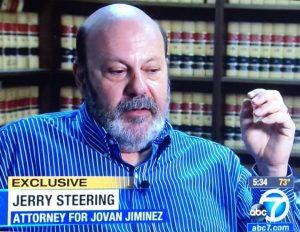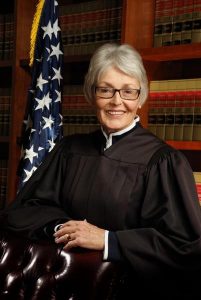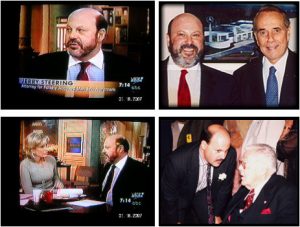
Jerry L. Steering has been practicing criminal law since 1984 (in California since 1986.) He has tried and otherwise litigated hundreds of criminal cases, including murder cases, manslaughter cases, assault and battery cases, drug possession and drug manufacturing cases, DUI cases, Vehicular homicide cases, white-collar investor fraud cases, sex-offender or drug offender registration cases, violation of court order cases, domestic violence cases, theft and embezzlement cases, towing industry cases, and the general spectrum of criminal violations. Mr. Steering’s law practice involves representing persons in California. He is also a member of the State Bar of Georgia and has also litigated cases in Georgia, Alabama and the District of Columbia. He is an expert in police brutality / excessive force and false arrest cases, and has been litigating these cases since 1984.The great majority of Mr. Steering’s law practice is devoted to defending bogus criminal cases against the victims of abuse by the police, and suing police officers and other government officials, for claims such as false arrest, police brutality / excessive force, malicious prosecution, and other “Constitutional Torts.”
Jerry L. Steering has been practicing criminal law since 1984 (in California since 1986.) He has tried and otherwise litigated hundreds of criminal cases, including murder cases, manslaughter cases, assault and battery cases, drug possession and drug manufacturing cases, DUI cases, Vehicular homicide cases, white-collar investor fraud cases, sex-offender or drug offender registration cases, violation of court order cases, domestic violence cases, theft and embezzlement cases, towing industry cases, and the general spectrum of criminal violations.
Mr. Steering is an expert in defending your bogus criminal action, in a way to best protect and enhance your ability to ultimately obtain some justice; reasonable compensation and redress, for your police beating; for your false arrest; for your unlawful search and seizure; for your malicious criminal prosecution; and for what’s usually at the center of all of the above, the exercise of our right to freedom of speech, and to complain to public officers, about misconduct by them or others, under the First Amendment to the United States Constitution.
PUBLICATIONS ON CRIMINAL LAW.
Mr. Steering is also a published legal scholar, and has a published Law Review Article a logical quandary of federal evidentiary law: the disparity in the use of “accomplice accusations” between Fourth Amendment (accomplice accusations sufficiently reliable to establish probable cause for search warrant), and Sixth Amendment analysis (accomplice accusations are so inherently unreliable, that Congress could not have meant to have included them with the ambit of the Declaration Against Penal Interest exception to the hearsay rule.) As explained in the Law Review Article, a statement is either made under circumstances that we believe indicate that they are reliable, or not. Although the tests may be somewhat different, the statement is either reliable or not, and treating the statement as unreliable for Sixth Amendment purposes, but as reliable for Fourth Amendment purposes, is simply illogical. See, “The Application Of Sixth Amendment Tests For The Reliability Of Hearsay Evidence To Probable Cause Determinations”, 16 Rutgers Law Journal 869 (1985.)
federal evidentiary law: the disparity in the use of “accomplice accusations” between Fourth Amendment (accomplice accusations sufficiently reliable to establish probable cause for search warrant), and Sixth Amendment analysis (accomplice accusations are so inherently unreliable, that Congress could not have meant to have included them with the ambit of the Declaration Against Penal Interest exception to the hearsay rule.) As explained in the Law Review Article, a statement is either made under circumstances that we believe indicate that they are reliable, or not. Although the tests may be somewhat different, the statement is either reliable or not, and treating the statement as unreliable for Sixth Amendment purposes, but as reliable for Fourth Amendment purposes, is simply illogical. See, “The Application Of Sixth Amendment Tests For The Reliability Of Hearsay Evidence To Probable Cause Determinations”, 16 Rutgers Law Journal 869 (1985.)
CRIMINAL TOWING INDUSTRY CASES.
Jerry L. Steering has substantial civil and criminal experience in the area of Private Property Impound cases. He has defend major felony prosecutions of tow truck companies and their drivers in Los Angeles County, Orange County and San Bernardino County. Many of these cases, that should at most have been a civil matter, have been converted into felonious conduct, by politically ambitious public prosecutors, following a series of incidents in the mid-2000′s, regarding “predatory towing.” Rather than the motorist having a mere civil dispute with the towing company, as prescribed by the Vehicle Code Sections 22658 and 22953, or infractions or even Vehicle Code misdemeanors, prosecutors are criminally prosecuting towing companies, and charging then with auto theft (Cal. Penal Code § 487(d)(1)), taking a vehicle without consent (Cal. Veh Code § 10851) and extortion (Cal. Penal Code §§ 518 and 519.) Their legal theory is basically that Section 22658 specifies the situations in which a towing company can legally tow a vehicle from private property without the consent of the owner / motorist, and that any violation of those Vehicle Code misdemeanors or infractions, also constitutes the unlawful taking of a vehicle without the owner’s consent; violation of Cal. Veh Code § 10851.
The DA’s also prosecute the same towing company and its drivers for extortion, Cal. Penal Code §§ 518 and 519, for demanding a towing fee and other associated charges, in order to release their vehicle to them; even for “drop fees.” In the minds of these politically ambitious prosecutors, your prosecution if their ticket to becoming a Judge, and they don’t care how many innocent lives they ruin to do it.
MR. STEERING HAS EXTENSIVE EXPERIENCE IN THE DEFENSE OF THESE TYPE OF CRIMINAL CHARGES, AGAINST TOWING COMPANIES AND ITS DRIVERS.
Predatory Towing Is, In Large Part, A Fiction.
When it comes right down to it, a non-consensual towing of a vehicle is either lawful or it’s not. If it’s lawful, than it can’t be predatory; or can it? The politicians scramble to demonize tow truck operators, who lawfully tow vehicles, because everyone hates have their car towed, and because they need a cause to trumpet in times of no other demons available for protecting against (when’s the last time that you heard Nancy Reagan’s “Just say no to drugs.”) If you park your car at your friend’s apartment complex in a fire lane zone, only to drop-off a package to your friend, and only intend to leave your car in that spot for three minutes. Should the towing company be able to grab and take-off with your car if they are lying in wait for someone to park in the fire lane? Is that really predatory towing? The politicians claim “Yes”, but there has been no laws broken.
So, What’s All The Hubbub About “Predatory Towing.”
Here’s the problem. Between 2000 and 2005, the issue of whether a California peace officer either could enforce the provisions of Cal. Veh Code § 22658(l), specifically that provision requiring that in the case of a nonconsensual towing of a vehicle by one in possession of private property, that the property owner or his agent be present at the scene of the tow, and personally authorize any such tow, in writing, at the scene, was in dispute. If the towing company was in federal court, they win, if they’re in state court, they lose. What? How can that be? How can a towing company successfully sue the police for arresting him for actions that the same towing company often got sued for, and criminally prosecuted for, in state court?
What Is A Private Property Impound?
A Private Property Impound is the nonconsensual towing of a parked vehicle from private property. It is usually initiated by either a security guard, property manager or property owner, calling a towing company, because someone parked their vehicle on private property, like an apartment complex, in violation of the California Vehicle Code. In order for one to have another’s car towed from private property, all entrances to the property must conspicuously display signage in the Vehicle Code’s required statutory language, and conforms to its physical signage requirements:
Cal. Vehicle Code Section 22658 provides in pertinent part:
“The owner or person in lawful possession of private property, including an association of a common interest development as defined in Sections 4080 and 4100 of the Civil Code, may cause the removal of a vehicle parked on the property to a storage facility that meets the requirements of subdivision (n) under any of the following circumstances:
(1) There is displayed, in plain view at all entrances to the property, a sign not less than 17 inches by 22 inches in size, with lettering not less than one inch in height, prohibiting public parking and indicating that vehicles will be removed at the owner’s expense, and containing the telephone number of the local traffic law enforcement agency and the name and telephone number of each towing company that is a party to a written general towing authorization agreement with the owner or person in lawful possession of the property. The sign may also indicate that a citation may also be issued for the violation. . . . .
Cal. Vehicle Code § 22658 also provides under what circumstances, a towing company may remove a properly signed parking area
. . . . l) (1) (A) A towing company shall not remove or commence the removal of a vehicle from private property without first obtaining the written authorization from the property owner or lessee . . . .
. . . . (B) The written authorization under subparagraph (A) shall include all of the following:
(i) The make, model, vehicle identification number, and license plate number of the removed vehicle.
(ii) The name, signature, job title, residential or business address and working telephone number of the person, described in subparagraph (A), authorizing the removal of the vehicle.
(iii) The grounds for the removal of the vehicle.
(iv) The time when the vehicle was first observed parked at the private property.
(v) The time that authorization to tow the vehicle was given . . . .
. . . . . (D) A towing company shall not remove or commence the removal of a vehicle from private property described in subdivision (a) of Section 22953 unless the towing company has made a good faith inquiry to determine that the owner or the property owner’s agent complied with Section 22953.
(E) (i) General authorization to remove or commence removal of a vehicle at the towing company’s discretion shall not be delegated to a towing company or its affiliates except in the case of a vehicle unlawfully parked within 15 feet of a fire hydrant or in a fire lane, or in a manner which interferes with an entrance to, or exit from, the private property.
(ii) In those cases in which general authorization is granted to a towing company or its affiliate to undertake the removal or commence the removal of a vehicle that is unlawfully parked within 15 feet of a fire hydrant or in a fire lane, or that interferes with an entrance to, or exit from, private property, the towing company and the property owner, or owner’s agent, or person in lawful possession of the private property shall have a written agreement granting that general authorization.
(2) If a towing company removes a vehicle under a general authorization described in subparagraph (E) of paragraph (1) and that vehicle is unlawfully parked within 15 feet of a fire hydrant or in a fire lane, or in a manner that interferes with an entrance to, or exit from, the private property, the towing company shall take, prior to the removal of that vehicle, a photograph of the vehicle that clearly indicates that parking violation. Prior to accepting payment, the towing company shall keep one copy of the photograph taken pursuant to this paragraph, and shall present that photograph and provide, without charge, a photocopy to the owner or an agent of the owner, when that person claims the vehicle. . . .
. . . . (4) A person who violates this subdivision is guilty of a misdemeanor, punishable by a fine of not more than two thousand five hundred dollars ($2,500), or by imprisonment in the county jail for not more than three months, or by both that fine and imprisonment.
(5) A person who violates this subdivision is civilly liable to the owner of the vehicle or his or her agent for four times the amount of the towing and storage charges. . . .. . . . (n) A vehicle removed from private
property pursuant to this section shall be stored in a facility that meets all of the following requirements:
(1) (A) Is located within a 10-mile radius of the property from where the vehicle was removed. . . .
. . . . (2) (A) Remains open during normal business hours and releases vehicles after normal business hours.
(B) A gate fee may be charged for releasing a vehicle after normal business hours, weekends, and state holidays. However, the maximum hourly charge for releasing a vehicle after normal business hours shall be one-half of the hourly tow rate charged for initially towing the vehicle, or less.
(C) Notwithstanding any other provision of law and for purposes of this paragraph, “normal business hours” are Monday to Friday, inclusive, from 8 a.m. to 5 p.m., inclusive, except state holidays.
(3) Has a public pay telephone in the office area that is open and accessible to the public.
So, What’s The Problem With Federal Preemption Of Cal. Vehicle Code § 22658? The Creation Of The Patrol Towing Industry.
In 1996, the owner of a towing company in Santa Ana, California, Patrick Tocher, was wrongfully put out of business, when the City of Santa Ana revoked his City of Santa Ana towing permit . Rather than lay down and take it, Mr. Tocher filed a “Pro Se” lawsuit against the City of Santa Ana; claiming, among other things, that the Federal Aviation Administration Authorization Act of 1994 (49 U.S.C. § 14501) preempted state and local laws on almost all towing issues; especially those dealing with the primary issue for what was to become that patrol towing industry; whether the property owner / manager can authorize a towing company to patrol their parking lots, and tow away vehicles that are either in violation of state or local laws, or otherwise in violation of the rules of that entity.
The United States District Court for the Central District of California (Judge Alicemarie Stotler) issued a permanent injunction, enjoining the City of Santa Ana, California, from enforcing not only its own Municipal Towing Ordinances, but also much of Cal. Veh. Code § 22658; that Vehicle Code Section that deals with private property impounds; the non-consensual towing of a vehicle from private property, because she found that those provisions of Section 22658(l) (and most others involving private property impounds), were not safety regulations.

In affirming the permanent injunction that had issued from Judge Alicemarie Stotler, the Ninth Circuit Court of Appeals held not only that the City of Santa Ana, California, was preempted by federal law, from regulating the towing of vehicles (i.e. requiring city towing permits, requiring that tow companies that do towing business in Santa Ana, maintain a tow yard in Santa Ana), but was also preempted from enforcement of those provisions requiring the presence and written consent of the owner or lessee of the private property (or their agent) for each tow. See, Tocher v. City of Santa Ana, 219 F.3d 1040 (9th Cir. 2000.) See also, “Tow Truck Operator Wins Suit”, L.A. Times, July 16, 2000.
Because the Ninth Circuit Court of Appeals enjoined the City of Sana Ana from enforcing the provision of Section 22658(l) requiring the presence and written consent of the owner or lessee of the private property (or their agent) for each tow, towing companies made a fortune by patrol towing. Here’s the routine? Towing companies would obtain General Authorizations from apartment complex or shopping center owners / managers to patrol their parking lots for parking violations, and when they found such violations, tow the violating vehicles. The towing companies would, for free, erect the proper signage for the property, and would get a list of apartment tenants. The towing companies would have parking permits printed-up and would give them to the property managers, to distribute their tenants. The tenants were told that they needed to have the parking permit conspicuously displayed on the tenants’ vehicles. Then, when the towing company would patrol the apartment complexes parking lots and find cars parked there without the required permit, or parked in a fire lane, a handicap zone or blocking traffic, they would tow the vehicle away as soon as possible.
Because many, if not most of the apartments that would have their lots patrolled were the type of apartments that had more persons residing there with vehicles than there were permits issued for a particular apartment (i.e. two parking permits issued per apartment, but four people with vehicle residing in such apartments), there would always be a treasure trove of vehicles to tow, and the towing companies didn’t disappoint. When the tow trucks came by at 3:00 a.m., there were always plenty of vehicles parked there that didn’t have permits, or were otherwise in violation of parking laws and rules (i.e. parking in fire lane, parked blocked traffic or parking in a handicap spot without a handicap sticker, all still prohibited by state law.) Towing cars from these lots was like fishing in a fish hatchery, filled with underfed hungry fish. The towing companies made a killing.
The apartment managers and many of the tenants, were also very happy about the whole arrangement, because many legitimate tenants who paid to live there, and who had a properly issued parking permits, wouldn’t have their own parking space to park in, and often had to park down the street from their paid for designated parking spot. Moreover, the apartment managers liked the arrangement, because it would cut down on drug dealing in their buildings, because drug purchasers would park their car in the lot, and go to the drug dealers apartment to buy their drugs. However, since they didn’t have a parking permit for that apartment complex, by the time that they returned to their unlawfully parked vehicles, they would find that their cars had been towed away. That certainly cut-down on the drug dealers dealing out of their apartment in such an apartment complex.
Moreover, commercial lots, may of which didn’t have enough parking for their merchant tenant’s patrons, also had their lots patrolled, and generally liked that arrangement. Okay, so now what’s the problem?
The Witch Hunt Against Tow Companies For Patrol Towing Results In State And Federal Legislation, And A United States Supreme Court Decision, On State And Local Control Of The Towing Industry.
The State Courts Claim Not To Be Bound By The Ninth Circuit Court of Appeals.
In 2001 in People ex rel. v Servantes, 86 Cal.App.4th 1081, 103 Cal.Rptr.2d 870 (2001), the First District Court of Appeal refused to follow Tocher, and held that Vehicle Code Section 22658(l)(1)(A) wasn’t preempted by the FAAA Act of 1994, and that in the case of a non-consensual tow of a vehicle from private property, other than in the case of an unlawfully parked vehicle that was either blocking traffic or parked in a fire lane, that a towing company needed to get specific written authorization from the private property owner or his/her agent for each tow, who also had to be present on the property at the time of the tow.
Accordingly, California state and local police agencies found themselves in a quagmire: under California law (Servantes), a towing company could be cited for misdemeanor violation of Vehicle Code Section 22658(l)(1)(A) for patrol towing, but if they did, the towing company could go to federal court, and (pursuant to Tocher) sue the police officers and their employing entity for injunctive relief and for damages, for enforcing Section 22658(l)(1)(A). Most, if not all police agencies responded by refusing to follow Servantes, but considerable resentment built-up over the years by police agencies and prosecutorial authorities against towing companies involved in patrol towing.
In response to this “political resentment” of the patrol towing industry, in 2005, in Tillison v. City of San Diego, 406 F.3d 1126 (9th. Cir. 2005), the Ninth Circuit partially backtracked on Tocher in holding that Cal. Vehicle Code § 22658(l)(1) is not preempted by 49 U.S.C. § 14501, because requiring that in the case of a non-consensual tow of a vehicle from private property, that the property owner or his/her agent be present on the property where the private property impound takes place, and requiring that the property owner or his/her agent authorize in writing each and every tow from the property (save the non-consensual towing of a car that is parked in a fire-lane or is blocking the flow of traffic), can properly be characterized as a safety regulation, and, therefore, exempted from federal preemption.

Moreover, in 2005, Congress enacted HR-3, that amended 49 U.S.C. § 14501, by adding 49 U.S.C. § 14501(c), that states:
“(5) Limitation on statutory construction.— Nothing in this section shall be construed to prevent a State from requiring that, in the case of a motor vehicle to be towed from private property without the consent of the owner or operator of the vehicle, the person towing the vehicle have prior written authorization from the property owner or lessee (or an employee or agent thereof) or that such owner or lessee (or an employee or agent thereof) be present at the time the vehicle is towed from the property, or both.”
Accordingly, while Cal. Veh. Code § 22658(l)(1) is now not preempted by Section 14501, other provisions of Cal. Veh. Code § 22658 still are so under federal law; something that the California First District Court of Appeal refused to recognize in People ex rel. v Servantes, 86 Cal.App.4th 1081, 103 Cal.Rptr.2d 870 (2001.)
Even with this change in law, if the towing company has a General Authorization to patrol the lot, and, the towing company finds a vehicle that is either: 1) parked in a way that’s blocking traffic, 2) parked in a fire lane, or 3) parked in a handicap space. Other than those exceptions, if a towing company wants to remove a vehicle from private property, such as a shopping center or an apartment complex, the owner of the property or their agent, must be present at the scene of the tow, and give their written authorization for the tow; actually requesting that the vehicle be towed.
In the commercial parking lot setting, Cal. Veh. Code § 22953 provides that when the requirements of signage and notice have been met for a commercial premises private parking lot (i.e. office buildings, shopping centers), that a vehicle still cannot be towed away from that private parking lot until the vehicle has been parked there for at least one hour. This one hour requirement is found in Cal. Veh. Code § 22953, that provides:
“Removal Prohibited
22953. (a) An owner or person in lawful possession of private property that is held open to the public, or a discernible portion thereof, for parking of vehicles at no fee, or an employee or agent thereof, shall not tow or remove, or cause the towing or removal, of a vehicle within one hour of the vehicle being parked.
(b) Notwithstanding subdivision (a), a vehicle may be removed immediately after being illegally parked within 15 feet of a fire hydrant, in a fire lane, in a manner that interferes with an entrance to, or an exit from, the private property, or in a parking space or stall legally designated for disabled persons.(c) Subdivision (a) does not apply to property designated for parking at residential property, or to property designated for parking at a hotel or motel where the parking stalls or spaces are clearly marked for a specific room.(d) It is the intent of the Legislature in the adoption of subdivision (a) to avoid causing the unnecessary stranding of motorists and placing them in dangerous situations, when traffic citations and other civil remedies are available, thereby promoting the safety of the general public.(e) A person who violates subdivision (a) is civilly liable to the owner of the vehicle or his or her agent for two times the amount of the towing and storage charges.
Amended Sec. 5, Ch. 609, Stats. 2006. Effective January 1, 2007.”
The Witch Hunt Against Tow Companies For Patrol Towing; Felony Prosecutions Against Towing Companies For Infraction / Misdemeanor Vehicle Code Towing Laws.
Since 2005, police and prosecutorial agencies have been engaged in “payback” for the five years (2000 to 2005) that the police watched towing companies engage in patrol towing (that still exists in the above-shown more restricted form; patrol towing of vehicles from private property that are either blocking traffic, or are parked in fire lanes). The “payback” was and is, prosecutions such as the case at bar; felony prosecutions for “auto theft”, extortion, attempted extortion and car jacking, for actions that the vehicle code specifically classify as misdemeanors.
This “political payback” also included various additions and amendment to the Vehicle Code. Until 2007, violations of the various provisions of the California Vehicle Code relating to the towing of vehicles were infractions[1]. That changed in 2007 when[2] the California legislature enacted AB 2210. In doing so, the legislature sought to increase penalties from infractions to misdemeanors for certain violations of the Vehicle Code regarding the non-consensual towing of vehicles from private property.
The cops and DA’s haven’t forgot 2000 through 2005. They are vigorously prosecuting towing companies and their drivers for felony auto theft and extortion, for even the most technical violations (i.e. no public payphone at tow yard; car towed more than 1o miles away, etc.).
If you’re being prosecuted for auto theft or extortion for vehicle towing, the Law Offices of Jerry L. Steering can help you.
Jerry L. Steering


Steering Law is a California-based civil rights and criminal defense firm led by Jerry L. Steering, Esq. The firm focuses on police misconduct cases, including excessive force, false arrest, malicious prosecution, contempt of cop incidents, and 42 U.S.C. §1983 civil rights actions, while also handling serious criminal defense matters. Steering Law is dedicated to protecting clients’ constitutional rights and delivering justice for individuals who have been wronged by law enforcement.